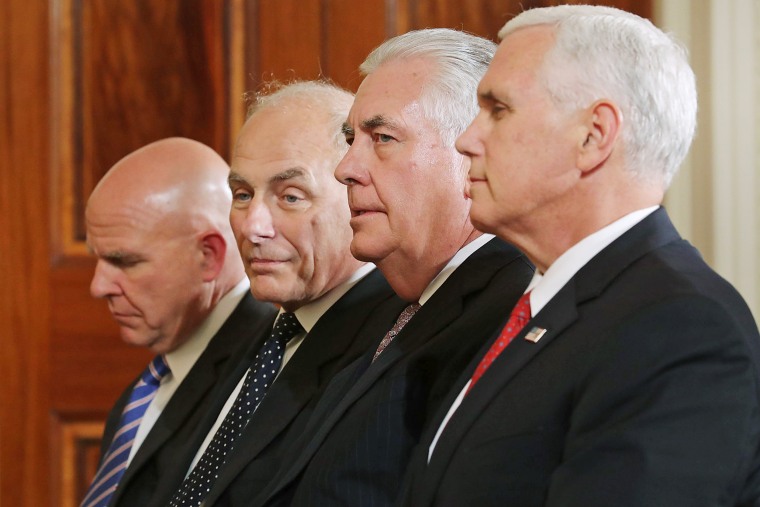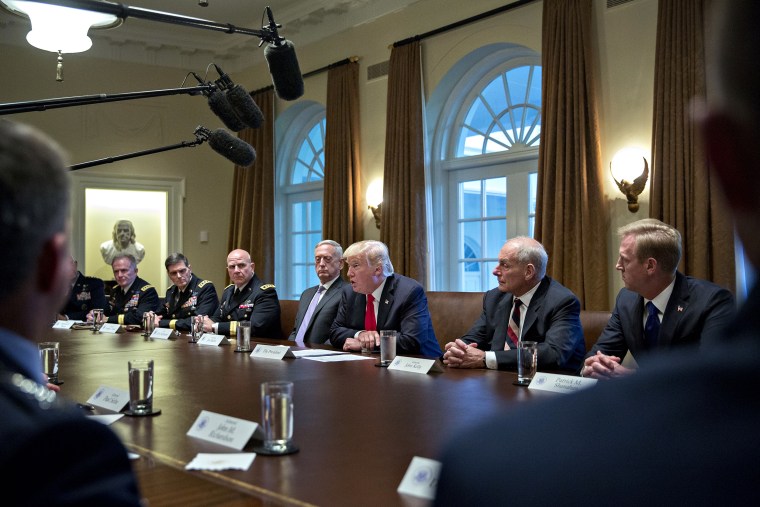President Donald Trump has brought more generals into the upper reaches of his administration than any other modern president. As for their tenure in office, we’re three for four. Or, maybe, two-and-a-half for four.
Ret. Gen. Michael T. Flynn, former national security adviser, made headlines this month after pleading guilty to a felony and agreeing to co-operate with special counsel Robert Mueller’s Russia probe. Yet Trump’s three remaining generals — two retired, Chief of Staff John Kelly and Defense Secretary James Mattis, and one still on active duty, National Security Adviser H.R. McMaster — continue to dominate the national security apparatus.
They’ve not only outlasted their critics but, unlike Secretary of State Rex Tillerson and Attorney General Jeff Sessions, seem to have largely escaped the president's public wrath.
Why? It’s not due to a shared worldview — insofar as Trump has a coherent one. No, the virtue of generals, for Trump, is their satisfying combination of alpha male-ness and deference.
Trump regularly asserts that he hired the generals partly because they look the part. They’re trim and ramrod-straight. Their faces are impassive, their speech terse and unadorned. When he hired Mattis, Trump — a fan of the 1970 movie about General George Patton starring George C. Scott — said Mattis was “the closest thing we have to General Patton.”
Ever the entertainer, Trump cites his generals as “central casting.” “If I’m doing a movie,” he said to Mattis, “I pick you, general.”
The virtue of generals, for Trump, is their satisfying combination of alpha male-ness and deference.
But looking the part isn’t enough. Tillerson might look the part of a secretary of state but his job has often seemed to hang by a thread, protected perhaps only by the embarrassment that his leaving would cause.
And, though you might think that the president who promised to “Make America Great Again” would want his generals to be the point of his military spear, they aren’t constantly beating the war drums. Indeed Mattis, The Washington Post noted, is more dovish than Trump on issues from torture to the North Atlantic Treaty Organization to the Iran deal.
No, the generals’ appeal for Trump lies deeper.
First, nobody is more indubitably alpha male than a general. These are guys who have spilled actual blood, an activity that renders most of their fellow citizens highly queasy.
Trump came to office promising a return to American strength after years of what he calls failed foreign policy by an effete establishment. But Trump isn’t exactly an embodiment of American toughness: He’s an overweight and out of shape 71-year-old man who escaped military service by claiming bone spurs and has said he fought his personal Vietnam on the battlefield of sexually transmitted diseases.
You can see why he’d want alpha males around — not so much to wage war as because he seeks personal proximity to masculine winners. The generals lend Trump masculinity by association.
Yet Trump’s delight in proximate alpha males presents him with a dilemma because he also clearly enjoys dominating others and has a keen — critics might say pathological — sense of threats to his dominance. This makes him intolerant of alpha male behavior.
Mattis succeeds by speaking to Trump “candidly but respectfully” and “plays down disagreements in public.”
When former White House chief strategist Steve Bannon made the cover of Time Magazine, Trump reportedly complained to staffers, according to The New York Times. Several months later, the advisor was gone. Bannon’s return to Breitbart allowed Trump to make him a confidant again, without admitting that Bannon might be pulling the strings of power. But Breitbart’s current critique of Trump’s strategy in the Russia probe shows the unreliability of such a relationship.
Herein lies the beauty of generals. Despite their alpha male-ness, generals obey the code governing the American military: They are explicitly constrained by the Constitution’s provisions that civilians control the military. Even after serving, generals respect these constraints. As The Washington Post recently observed about Mattis, he succeeds by speaking to Trump “candidly but respectfully” and “plays down disagreements in public.”
This combination of masculinity and deference isn’t an oxymoron but an amalgam that perfectly suits Trump’s needs.
If you’re Trump, it’s a treasure you don’t easily discard. No wonder Trump keeps calling them “my generals” in the same proprietary way he’s called his wife, Melania, “my supermodel.”
But will this formula allow the generals to be the “adults in the room,” restraining a president who lacks impulse control?

Don’t count on it. We’re not talking Dwight D. Eisenhower or George C. Marshall here, let alone Colin Powell or Alexander Haig — just your basic war heroes. When generals have to perform beyond their political competence, they’re as fallible as anybody else.
Consider the first foray by Kelly, Gold Star father, into conventional politics. In Kelly’s press conference after Trump’s botched phone call to the widow of Sgt. La David Johnson, killed in Niger, Kelly deployed his military credentials and story to protect his boss from political attack. And he failed.
He gave a harrowing account of the loss of a soldier in battle. As public discourse goes, this story was a rock from which no critic could possibly dislodge him. Then, Kelly left solid ground and wandered into the treacherous political sea.
He confirmed that Trump said what the president had denied saying. He recounted what he had told the president to say — which was, in Kelly’s elegant formulation, a world away from Trump’s flat-footedness. But in attacking Rep. Frederica Wilson (D-Fla.), who witnessed the effects of Trump’s phone call, Kelly made factual errors that gave his critics ammunition.
The controversy intensified press attention to the underlying question of what we’re doing in Niger in the first place. Welcome to politics, General Kelly.
So, it’s not exactly three generals left, it’s more like two-and-a-half, since Kelly has partially squandered the aura that the generals lend this White House. It takes more than military stars to provide good political advice — let alone political cover — for a president with a tin ear.
It’s too bad the president can’t seem to tolerate advisers with a broader skill set.
Suzanne Garment, a lawyer, is the author of “Scandal: The Culture of Mistrust in American Politics.”

